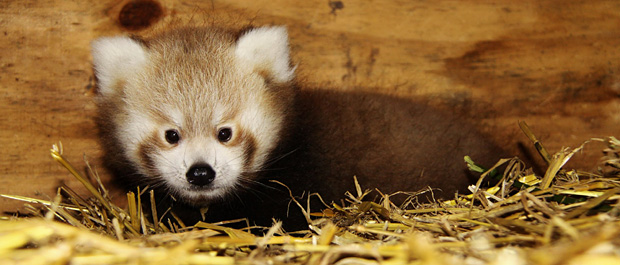Stonehenge

Red Panda Baby at Longleat four. Photo by Ian Turner
A rare red panda cub has been born at Longleat after keepers launched an international lonely hearts ad to find a mate for their male.
It’s the first time the famous Wiltshire safari park has successfully bred red pandas and keepers are delighted with how well the cub, which has yet to be named, is doing.
Dad Ajenda, which means ‘King of the Mountain’, came to Longleat from Germany in 2012 and mum Rufina, meaning ‘red-haired’, arrived from Italy just over a year later, following an appeal by keepers.
The birth is particularly welcome as this particular pairing is deemed to be critical to the ongoing success of European Endangered Species Programme for the Red Panda.
Like their famous, but unrelated, namesakes the giant pandas, red pandas are increasingly endangered in the wild.
The species was officially designated as ‘Vulnerable’ by the International Union for Conservation of Nature (IUCN) in 2008 when the global population was estimated at about 10,000 individuals.
A ‘Vulnerable’ species is one which has been categorised as likely to become ‘Endangered’ unless the circumstances threatening its survival and reproduction improve.
“We’re delighted with how well Rufina is looking after the young cub and both mother and baby are doing brilliantly,” said keeper Robert Curtis.
“Cubs don’t tend to start venturing out on their own for the first three months and Rufina, like all red panda mums, regularly moves the cub to different nesting areas.
“This is perfectly natural behaviour but makes keeping track of the baby, or even confirming what sex it is, somewhat problematic for us!” he added.
Found in Nepal, Bhutan and China, they live among bamboo forests and spend much of their time in trees.
In the wild red pandas are solitary animals, and they only really ever come together to breed.
Like giant pandas about two-thirds of their food intake is made up of bamboo. Bamboo is not the most nutritious of foods so they have to eat a lot of it to survive.
As it is relatively low in calories, red pandas tend to spend much of their time either eating or sleeping.
As well as plain bamboo keepers supplement their diet with a mix of fruits, eggs and the occasional insects. They also make a special type of bamboo cake which the pandas are especially fond of.